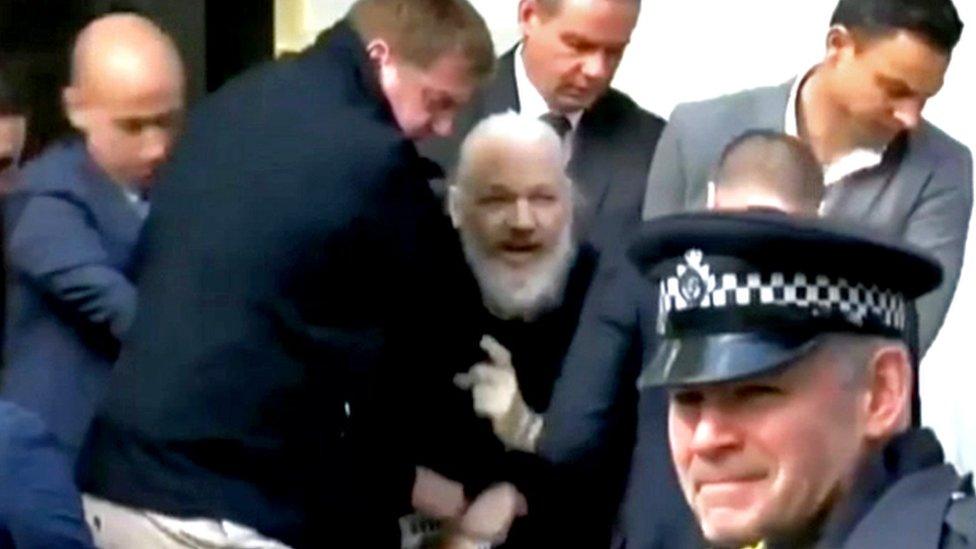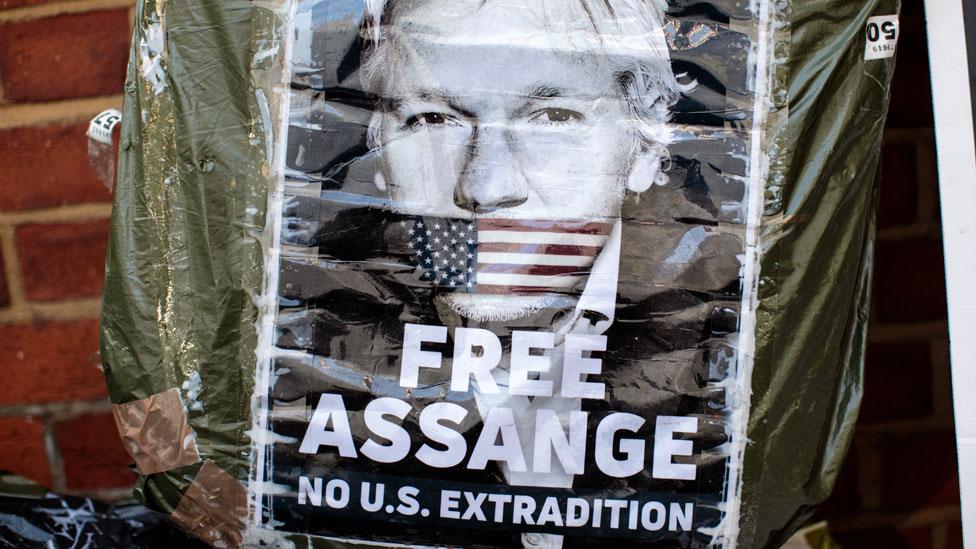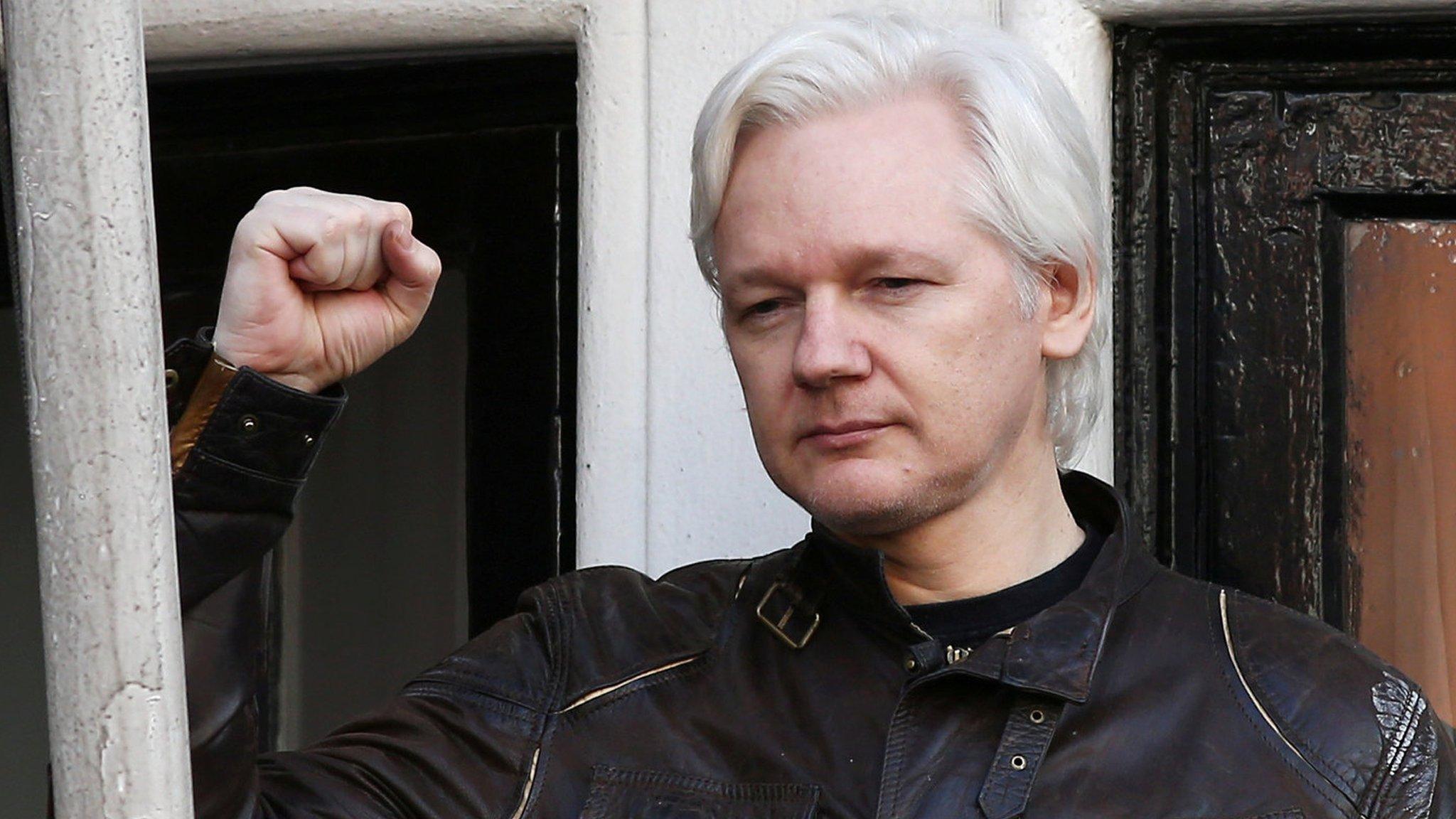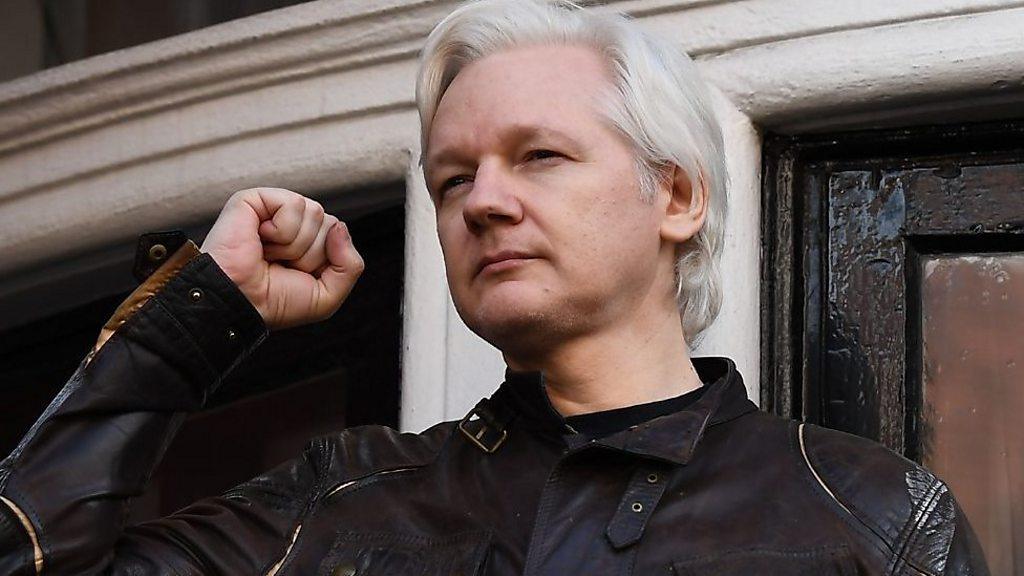Julian Assange must face Swedish justice first - MPs and peers
- Published

More than 70 MPs and peers have signed a letter urging the home secretary to ensure Julian Assange faces authorities in Sweden if they want his extradition.
The Wikileaks founder, who is now in UK custody, was arrested on Thursday after years in Ecuador's London embassy.
Sweden is considering whether to reopen an investigation into rape and sexual assault allegations against him.
And the US is seeking his extradition in relation to one of the largest ever leaks of government secrets, in 2010.
The whistle-blowing website Wikileaks has published thousands of classified documents covering everything from the film industry to national security and war.
The Swedish case
Assange sought refuge in the Ecuadorian embassy in 2012 to avoid extradition to Sweden over allegations of sexual assault, which he has denied.
At the time, the Australian-born 47-year-old said he had had entirely consensual sex with two women while on a trip to Stockholm, and that the Swedish claims against him were part of a smear campaign.
Swedish prosecutors dropped a rape investigation into Assange in 2017 because they were unable to formally notify him of allegations while he stayed in the embassy.
Two other charges of molestation and unlawful coercion had to be dropped in 2015 because time had run out.
But Swedish prosecutors say they are now re-examining Assange's case at the request of the lawyer acting for the alleged rape victim.
The letter
In their letter to Sajid Javid, 70 parliamentarians - chiefly Labour MPs and peers - urged him to "stand with the victims of sexual violence" and ensure the rape claim against the Wikileaks founder could be "properly investigated".
"We do not presume guilt, of course, but we believe due process should be followed and the complainant should see justice be done," the letter said.
Labour's Stella Creasy tweeted a copy of the letter sent to Mr Javid. , external
The same letter was also sent to shadow home secretary Diane Abbott.
Labour leader Jeremy Corbyn has said the UK government should not extradite Julian Assange to the US.
But speaking on Saturday, Mr Corbyn said he had made it "very clear all along that if there are allegations which Julian Assange needs to answer, of sexual issues, sexual attacks that may or may not have taken place in Sweden, then it's a matter for the courts to decide - but I do think he should answer those questions".
He added: "My objection was to his extradition to the United States because I do believe that Wikileaks told us the truth about what was actually happening in Afghanistan and in Iraq."
The Labour leader said it was now for Sweden to put forward proposals on the matter.
Shadow foreign secretary Emily Thornberry also said on Friday she was "disgusted" the US allegation had been "allowed to eclipse" the sex offence case.
One of the letter's signatories, Stephen Kinnock, told the BBC the events surrounding Assange had "become politicised", and that the letter was intended "to underline the point that first and foremost Mr Assange is accused of rape and sexual violence in Sweden".
"It is vital that doesn't get airbrushed out of the conversation."
The arrest
Assange was dramatically arrested by UK police on Thursday after Ecuador abruptly withdrew its asylum.
Westminster Magistrates' Court found him guilty of a charge of breaching bail later that day. He faces up to 12 months in prison for that conviction.
The letter from parliamentarians says both UK and US authorities seem to have been aware in advance of Ecuador's decision to rescind Mr Assange's political asylum, but said it was a matter of "grave concern" that Swedish authorities did not appear to be aware of the impending arrest.
Julian Assange being dragged from the Ecuadorean embassy in London
The US case
The United States alleges that Assange conspired with former US Army intelligence analyst Chelsea Manning to access classified information on Department of Defense computers.
Documents published by Wikileaks relating to the wars in Iraq and Afghanistan revealed how the US military had killed hundreds of civilians in unreported incidents.
The US has already charged Assange with a single count of participating in the hacking of intelligence computers, external to reveal controversial intelligence operations in the United States.
If found guilty, Assange could be jailed for up to five years.
What happens next?
Extradition proceedings are dealt with by the courts.
According to the Home Office, the home secretary can bring a limited number of factors into consideration when deciding whether to order a person's extradition.
These include whether the person might be at risk of the death penalty or whether the requesting state might try to add additional charges it has not specified.
Lawyer Rebecca Niblock said that, if Sweden made an extradition request, it would be for the home secretary to decide which would take precedence, considering factors such as which was made first and the seriousness of the offence.
The rape allegation in Sweden has a limitation period which expires in August 2020; inquiries into claims of molestation and unlawful coercion have already been timed out.
Assange is due to face a hearing over his possible extradition to the US on 2 May.
His lawyer, Jennifer Robinson, said they would be fighting the extradition request. She said it set a "dangerous precedent" for journalists publishing information about the US.
The UN has called for his right to a fair trial to be respected during any extradition process.
- Published12 April 2019

- Published12 April 2019

- Published11 April 2019

- Published30 October 2018

- Published25 June 2024

- Published11 April 2019

- Published26 June 2024
